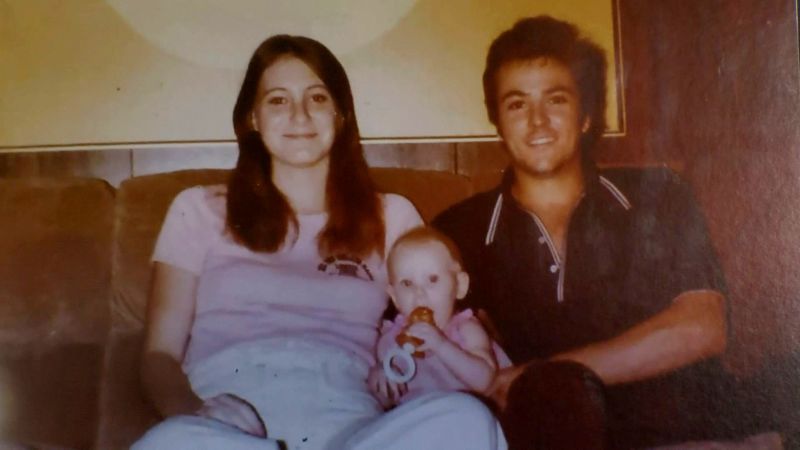coffee, toast, feeding her cat. At 42, she was reserved, her knitted sweaters and soft smile masking a distance no one could place. Her earliest memories began at 11, with Paul Jensen, the widowed sawmill worker who raised her. He called her his “greatest gift,” never explaining her lack of baby photos or a mother. Clare didn’t question it—until an email landed in her spam folder: “I think I know who you are.” A link to a news clip showed her at a fair, and a comment read, “Is that Clare Markham, missing since 1988?”
The clip, from a Helena station covering a marching band, showed Clare in a beige coat, hands clasped, unaware of the camera. The commenter, Amy Callahan, claimed to be her childhood friend from Boulder. Amy arrived at Clare’s door with a 1987 class photo from Maplewood Elementary: a girl with pigtails, a red bow, and Clare’s face. “You were my best friend,” Amy said, voice trembling. “They told us you were dead.” Clare’s world tilted. She had no memory of Boulder, no recollection of being Clare Markham, but the scar on her elbow matched the girl’s in old news reports.

Clare’s life unraveled in fragments. A maroon journal in Paul’s closet revealed his guilt: “I never asked where she came from… I feel like a criminal.” A suitcase in her basement held a unicorn music box, a baby shoe, and a book inscribed, “This belongs to Clare Markham.” A cassette, labeled “Clare, age five,” played a child’s voice—hers—singing “Twinkle, Twinkle, Little Star” with a woman’s laughter: “Mommy’s so proud of you, Clary.” The sound cracked Clare open. Flashes of a green couch, cinnamon toast, a screen door flickered, not memories but echoes in her bones.
Amy brought a drawing from 1988: two girls labeled “me and Amy,” and a man, his name violently scratched out. “You were scared of him,” Amy said. Clare’s recurring dream—of a car, trees blurring, a humming voice—felt less like a nightmare now. Margaret Doyle, a retired journalist who covered Clare’s case, saw the TV clip and dug into her notes. A 1989 tip mentioned a girl like Clare at a Butte gas station with a man in a coat. At the derelict site, Clare stood by a soda machine, a memory hitting: holding a man’s hand, not Paul’s, his fingers stained, eyes brown.
Detective Rosa Mendes, assigned to the cold case, found Paul’s name in a 1988 report: a blue sedan, like his, idled near Clare’s house the day she vanished. No adoption records existed for Clare Jensen before 1994. Rosa uncovered Lyall Kratic, a social worker with a shady past, linked to a defunct agency forging child placements. A file labeled “CLA M, 1988” held a forged birth certificate and Clare’s photo, blank-eyed. “You were sold,” Rosa said. Clare’s DNA, tested after the TV sighting, matched Leanne Markham’s, submitted in 2024 after a cold case documentary.
Clare met Leanne in a Boulder church, their embrace wordless, raw. Leanne shared memories: Clare’s unicorn obsession, naming a worm Martin, hating green grapes. Clare cried, some details familiar, others foreign. Lucas had died at 17; her father, from cancer. Leanne never stopped searching, losing everything but hope. Paul’s letters, found later, confessed he learned Clare was stolen but kept her, fearing loss. “I’m a coward or a monster,” he wrote. Clare grieved the man who loved her, yet hid her truth.

A final envelope arrived: a photo of another girl with a unicorn toy, captioned, “She’s not the only one.” Rosa traced it to Madison Riley, missing since 1989 from Salt Lake City, a unicorn plush gone from her bed. Clare confronted Lyall, now dying in an Oregon hospital. “You stole me,” she said. He coughed, “I gave you a better life.” Clare’s voice was steel: “You ended lives.” She walked away, unshackled.
Clare launched the Unicorn Project, a nonprofit aiding missing children’s families with DNA and support. She spoke at a Helena community center, her voice steady: “I don’t remember everything, but I remember who I am now.” Leanne visited for Christmas, making cinnamon toast. Amy, Margaret, and Rosa became family. Clare’s drawings—past and present selves holding hands—adorned her fridge. At Paul’s grave, she left a sketch, whispering, “Thank you for keeping me alive.”
In Boulder, under the oak tree where she’d buried a lunchbox pleading, “Take me back to my mom,” Clare drew herself whole. Another girl was out there, waiting. Clare vowed to find her, because she knew what it meant to be lost—and to be found.
Leave a Reply